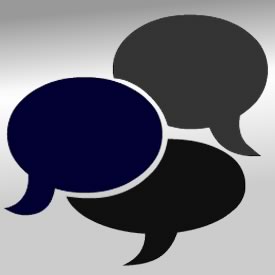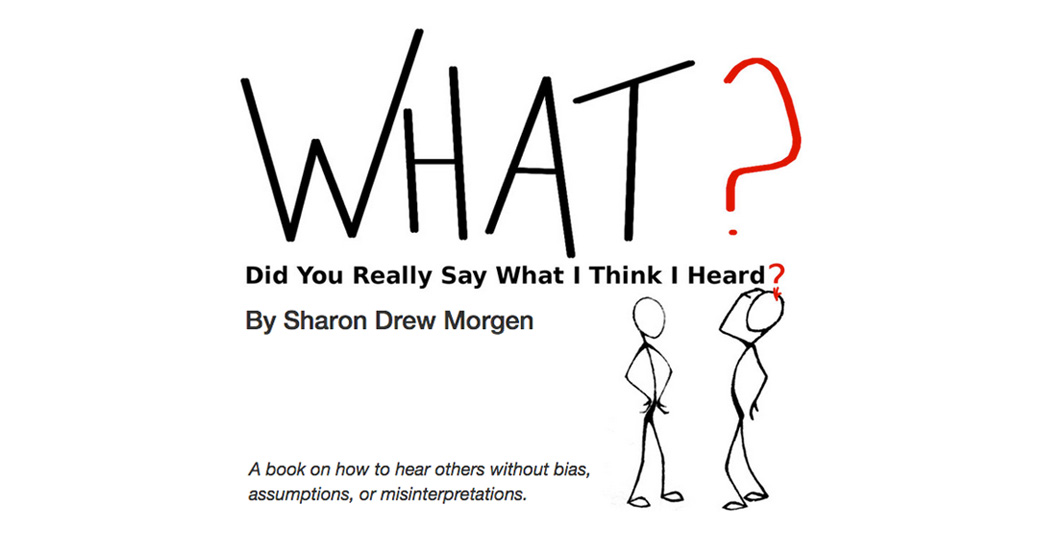The Discipline of Listening
 Our brains make it difficult, if not impossible, to fully or accurately comprehend what our Communication Partners wish to convey. Entering through our ears and traveling through our neural pathways in five one-hundredths of a second, incoming sound vibrations get deleted, filtered out, and sent to ‘similar enough’ circuits for translation, not necessarily matching what the Speaker intended. And because our brain doesn’t tell us what it deleted or misinterpreted, what we end up thinking we’ve heard may be an altered rendition of what was said.
Our brains make it difficult, if not impossible, to fully or accurately comprehend what our Communication Partners wish to convey. Entering through our ears and traveling through our neural pathways in five one-hundredths of a second, incoming sound vibrations get deleted, filtered out, and sent to ‘similar enough’ circuits for translation, not necessarily matching what the Speaker intended. And because our brain doesn’t tell us what it deleted or misinterpreted, what we end up thinking we’ve heard may be an altered rendition of what was said.
I spent 3 years researching and writing on this topic for a book, (What?) and came away in awe of the magnitude of this issue and how deeply our neurology prejudices our conversations, and how much of what we think we hear someone say is inaccurate.
THE PROBLEM WITH GOAL-CENTERED LISTENING
When we listen for something specific, the problem is compounded: we often take away a myth as meaning. As a coach to coaches, sellers, and managers, I’m painfully aware of how sellers often listen only to “recognize a need“, or coaches listen for a problem they’ve had success resolving before, or managers listen for a difficulty they know how to regulate.
The very act of listening for something specific causes a further diminution of real understanding, providing some unknown percentage of accurate data with which to base follow-on decisions, not to mention that everyone potentially walks away from the conversation with mistaken beliefs, feelings, and expectations. And then we blame the Other for any failure.
Sadly, because our brains don’t tell us they have misunderstood or biased what was said (we have no reason but to believe we’ve “heard” accurately), we’re rarely aware that we have missed the meaning or the possibility until it’s too late.
TIPS TO LISTEN ACCURATELY
Here are some questions to think about as you consider adding some discipline to your listening skills:
- Prepare and De-stress. Before each conversation, clear your mind of any expectations or hopes, or feelings from past conversations. Otherwise your brain will unconsciously seek confirmation (Confirmation Bias) for that very thing while ignoring or misconstruing possibilities (minimizing your chances of success or creativity).
- Humility and humor. Unless you have written a script that everyone speaking has signed off on, you have no way of knowing what your Communication Partner will say, mean, need, or feel. I often hear people attempt to push their own agenda and don’t recognize what the Other has conveyed. Since there is no such thing as win/lose, this tends to create lose/lose, although the offended Communication Partner might not mention it during the conversation.
- Flexibility. All conversations demand flexibility to be present to the messages within the dialogue that actually occurs. The larger the bias or expectation going in, the harder it is to achieve, the greater the gap in understanding and expectation, and the greater the fallout from unrealized possibility.
- Trust. I know it’s hard to walk away without getting exactly what you want, or to hear things that don’t match your needs or expectations, but somewhere in the conversation there is a creative win for everyone. It may not look or act like your dream, but it will be something that everyone can accept. Besides, if you’re not trusting the dialogue actually occurring, you’re merely pushing your own agenda. And then you can’t even trust the outcome you’ve devised.
Unless both sides of a conversation fully understand what the Other intends to convey, there is no reality to work with and everyone risks unnecessary failure or limited possibility: it might have been possible to achieve success in a different way, or maintain a relationship over time for future possibilities. In almost every in-person coaching session I have had, my client has missed real possibilities (even of getting exactly what they want) in pursuit of hearing what they believe they should hear.
Here are some questions to think about as you consider adding some discipline to your listening skills:
- How adept are you at entering conversations with no needs, no expectations, no biases?
- How capable are you of showing up in a conversation with the ability to have a We Space – not two “I’s” which lead nowhere except self-serving exchanges, but a genuine melding of the people involved to find the win for all?
- What do you need to believe differently to recognize that when you enter conversations with personal biases, assumptions, and triggers, that you will only succeed those times when the Other has the exact same biases, assumptions, and triggers – and all those who could truly benefit from your expertise and heart will not be able to hear you either (regardless of how well-meaning or accurate you are)?
- How willing are you to learn to show up with an open mind, recognize when you have biases or expectations and quiet them before starting the exchange?
- How can you react to something you’re not prepared for in a way that encourages collaborative dialogue?
You can continue doing what you’ve been doing, of course. But for those times you seek excellence in your conversations, a bit of preparation is in order.
____________
Sharon-Drew Morgen is a breakthrough innovator and original thinker, having developed new paradigms in sales (inventor Buying Facilitation®, listening/communication (What? Did you really say what I think I heard?), change management (The How of Change™), coaching, and leadership. She is the author of several books, including the NYTimes Business Bestseller Selling with Integrity and Dirty Little Secrets: why buyers can’t buy and sellers can’t sell). Sharon-Drew coaches and consults with companies seeking out of the box remedies for congruent, servant-leader-based change in leadership, healthcare, and sales. Her award-winning blog carries original articles with new thinking, weekly. www.sharon-drew.com She can be reached at sharondrew@sharondrewmorgen.com.
Sharon Drew Morgen April 10th, 2023
Posted In: Listening

